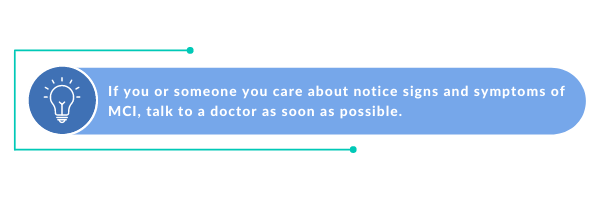Mild Cognitive Impairment
Mild cognitive impairment, often referred to as MCI, is a condition that affects memory and thinking skills.1 Symptoms of MCI are not as severe as those of Alzheimer’s disease and related dementias and people living with MCI can continue to carry out everyday life activities independently. While people with MCI are more likely to develop Alzheimer’s disease and related dementias, not everyone with MCI will get these conditions. In some cases, MCI symptoms stay the same or improve over time. About 15% of people with MCI will develop dementia after 2 years.
What causes mild cognitive impairment?
There is no single cause of mild cognitive impairment.1 Some of the risk factors for MCI include increasing age and chronic diseases like diabetes, high blood pressure, and stroke.
What are the signs & symptoms of mild cognitive impairment?
The signs and symptoms of MCI often fall somewhere in between changes associated with normal aging and dementia.2 Similar to Alzheimer’s disease, a common early sign of MCI is memory loss. Other signs may include losing things often or having trouble coming up with words.

How is mild cognitive impairment diagnosed?
There is no single test to diagnose MCI.1 Doctors can perform a series of tests such as memory assessments or blood tests to help determine if symptoms are due to MCI. They may also suggest speaking with a specialist to make a definitive diagnosis. Since people with MCI are more likely to develop Alzheimer’s disease and related dementias, it is important to speak with a doctor early and track any changes in symptoms that occur over time.
How is mild cognitive impairment treated?
While there is no standard treatment for MCI, there are strategies to help improve memory changes and help you feel better.2 Here are some tips to try:
- Engage in enjoyable activities, such as listening to music or journaling
- Use calendars, to-do lists, or reminders (digital or written) to stay on top of important information
- Maintain a balanced diet and engage in regular physical activity
- Spend time with family and friends
The United States Food and Drug Administration (or FDA) has approved Lecanemab (Leqembi) and Aducanumab (Aduhelm) as treatments for people living with MCI due to Alzheimer’s disease and people with early-stage Alzheimer’s disease.3 However, it is not currently widely used. To learn more about these treatments and how to navigate different treatment options, visit Alzheimer’s Association.

References
- Alzheimer’s Association. (2022). Special Report - More than Normal Aging: Understanding Mild Cognitive Impairment. https://www.alz.org/getmedia/257803ff-0335-4882-a37b-c4acb77b1a66/alzheimers-facts-and-figures-special-report-2022.pdf
- Alzheimers.gov. What is Mild Cognitive Impairment? https://www.alzheimers.gov/alzheimers-dementias/mild-cognitive-impairment
- Alzheimer's Association. Treatments. https://www.alz.org/alzheimers-dementia/treatments?lang=en-US

